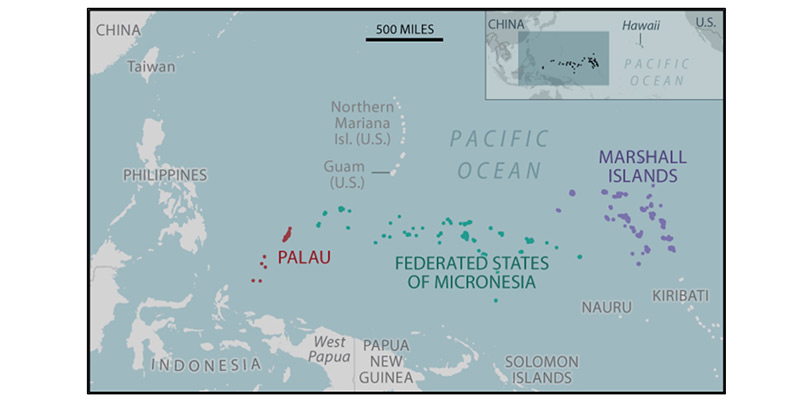- World
- Oct 17
Explainer - Compacts of Free Association (COFA)
• The United States signed a new 20-year agreement on economic assistance to the Marshall Islands worth $2.3 billion to the strategic Pacific island nation.
• The Republic of the Marshall Islands is one of three sprawling but sparsely populated nations that have US ties governed by Compacts of Free Association (COFA).
• Under COFA, Washington is responsible for their defence and provides economic assistance, while gaining exclusive military access to strategic swathes of ocean.
• Earlier this year, the Biden administration agreed new deals with the two other states, Palau and Micronesia.
Marshall Islands
• The Republic of the Marshall Islands is an island country near the equator in the Pacific Ocean, just west of the International Date Line.
• The population of 68,480 people is spread over 29 coral atolls, with 1,156 islands and islets. When combined, it only takes up a land area of 70 square miles, making it one of the smallest countries in the world. However, these islands are spread out over nearly 750,000 square miles of the Western Pacific.
• Japan seized the Marshall Islands in 1914 and was granted a League of Nations Mandate to administer the islands in 1920. Japan built large military bases throughout the Marshall Islands.
• During World War II, the US captured the bases on Kwajalein, Enewetak, and Majuro Atolls in Operations Flintlock and Catchpole.
• After gaining military control of the Marshall Islands from Japan in 1944, the US assumed administrative control of the Marshall Islands under United Nations auspices as part of the Trust Territory of the Pacific Islands in 1947.
• In 1978 the Marshall Islands in a referendum broke away from the rest of Micronesian countries and opted for a separate Constitution. In 1979 its Constitution was ratified. The country gained independence and signed a Compact of Free Association (COFA) with the United States in 1986.
• The 1979 constitution provides for a unicameral parliamentary system. However, the President is elected by members of the Nitijela (parliament), and serves as the head of government as well as the Head of State.
• The Marshall Islands is a sovereign nation. While the government is free to conduct its own foreign relations, it does so under the terms of the COFA.
• The Marshall Islands uses the US dollar as its currency.
• Strategically, Marshall Islands hosts the US Army Kwajalein Atoll (USAKA) Reagan Missile Test Site, a key installation in the US missile defence network.
• Marshallese citizens can work and study in the US without a visa, and they join the US military at a higher rate than any US state.
Compacts of Free Association (COFA)
• The Compacts of Free Association (COFA) govern the relationships between the US and the Republic of the Marshall Islands, Federated States of Micronesia, and Republic of Palau — known collectively as the Freely Associated States (FAS).
• The governments of the Marshall Islands and Micronesia signed Compacts of Free Association (COFA) with the United States in 1982. The COFA entered into force in 1986.
• The US-Palau COFA entered into force in 1994.
• COFA granted the Marshall Islands financial assistance and access to many US domestic programmes in exchange for exclusive US military access and defence responsibilities.
• By the provisions of COFA, the US and the Marshall Islands negotiated a new financial package in 2003, covering 2003-2023.
• Under the pact, the US provides economic and financial aid and defends the territorial integrity of Marshall Islands. In return, the Marshall Islands provides the US with unlimited and exclusive access to its land and waterways for strategic purposes.
• US-FAS negotiations to renew Compact economic assistance began in 2020.
• In May 2023, the US signed agreements with Micronesia and Palau on extending economic assistance. The agreements include grant assistance and trust fund contributions for Micronesia and Palau that total $3.3 billion and $0.9 billion, respectively, for FY2024-FY2043.
• Compensation for past nuclear testing remained a sticking point in the negotiations to finalise an agreement on extending Compact assistance to Marshall Islands. From 1946 to 1958, the US conducted 67 atmospheric atomic and thermonuclear weapons tests over the Marshall Islands atolls of Bikini and Enewetak. The US government has provided, by some estimates, roughly $600 million for damages, environmental cleanup and restoration, resettlement, and health and medical programmes.
• The legacy of US nuclear testing in Marshall Islands has adversely affected human security, public health, and environmental safety and caused the loss of customary land and cultural heritage.
• The FAS economies face structural challenges similar to many other Pacific Island Countries, including lack of economies of scale, small land areas, limited natural and human resources, remote locations, poor infrastructure, and vulnerability to climate change.
• The FAS play a role in supporting the US security presence in the Pacific Islands region at a time of increasing strategic competition between the US and its allies, on one hand, and China, on the other. The Biden Administration’s 2022 Indo-Pacific Strategy refers to the Compacts of Free Association as “the bedrock of the US role in the Pacific”.
Manorama Yearbook app is now available on Google Play Store and iOS App Store

